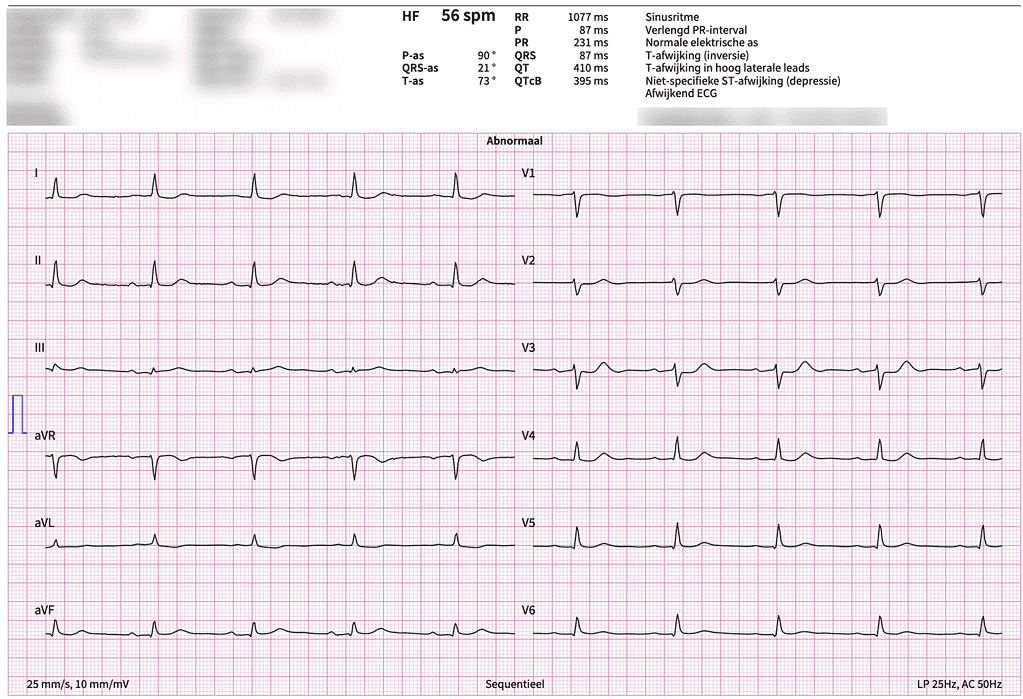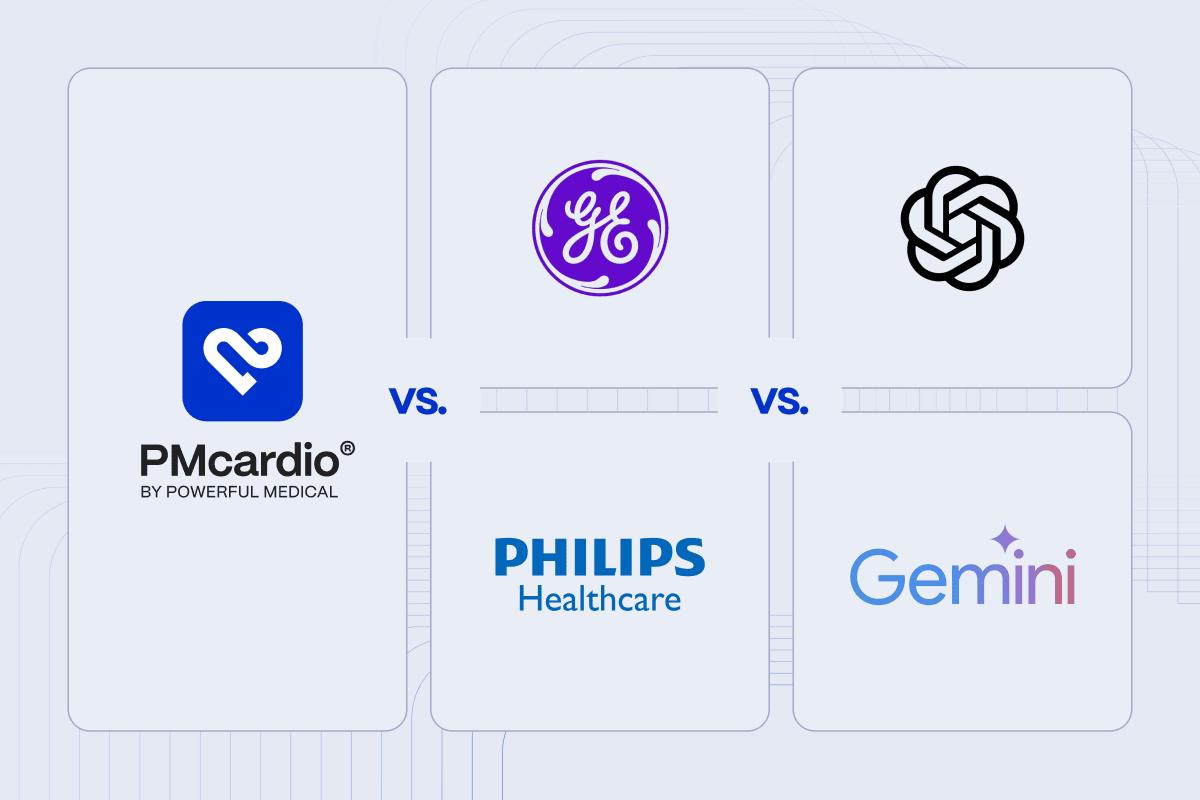Interpreting ECGs accurately and swiftly is essential for clinicians at every frontline patient encounter—from primary care to emergency settings. Choosing the appropriate interpretation tool significantly impacts patient outcomes. Today, we explore three accessible solutions for clinicians: Conventional ECG Algorithms, General AI language models like ChatGPT, and PMcardio.
How do ECG Interpretation Tools Differ?
1. Conventional ECG Algorithms (e.g., GE HealthCare, Philips, Glasgow Algorithm)
Key Features:
-
- Statistical analysis based on limited ECG fiducial points and a set of hand-crafted rules derived from relatively small datasets (hundreds to thousands of ECGs).
- Automated interpretations printed directly on ECG reports.
Pros:
-
- Immediately available at the ECG recording.
- Integrated within ECG machines.
- Operates offline, without needing an internet connection.
- Commonly available in emergency departments.
Cons:
-
- Limited to newer, digital ECG machines.
- Often vague, non-specific interpretations.
- Reduced accuracy in noisy or atypical ECG cases.
- Provides limited actionable clinical information.
2. General AI Tools (e.g., ChatGPT, Gemini)
Key Features:
-
- Broad AI trained on general data, not specifically medical.
- Natural language interpretation and dialogue capabilities.
Pros:
-
- Versatile use for preliminary differential diagnosis.
- Accessible through mobile devices and web applications.
- Helpful for general patient management options.
Cons:
-
- Not specialized for ECG interpretation.
- High risk of inaccuracies and hallucinations, potentially causing misdiagnosis.
- Lack of clinical validation and regulatory approval.
- Inconsistent performance and reliability.
3. PMcardio: Specialized Deep Neural Network for ECG
Key Features:
-
- Advanced Deep Neural Network trained on millions of ECG cases.
- Clinical validation against rigorous, core-lab outcomes.
- Detects up to 49 different conditions.
- Certified medical device ensuring high clinical standards.
Pros:
-
- Compatible with any 12-lead ECG (image or paperform).
- Does not require complex clinical integration.
- Highly accurate, especially in challenging or noisy ECG conditions.
- Explainable AI diagnostics with intuitive visual heatmaps.
Cons:
-
- Requires a stable internet connection.
Real-World Comparison: One Patient, Three Interpretations
Patient Scenario
-
- Patient Background: A 70-year-old woman presents to the emergency room with progressively worsening chest pain. She has a history of hypertension and hyperlipidemia.
- Actual Diagnosis: Acute Infero-Posterior STEMI due to proximal total occlusion of the Left Circumflex (LCx) artery.
- Clinical course: Delayed diagnosis resulted from incorrect ECG interpretation, causing coronary angiography to be performed 24 hours later. Detailed ECG and angiogram are available here.

ECG Interpretations Compared
Conventional Algorithm, GE Marquette 12SL (used prospectively):
-
- “Sinus rhythm, Prolonged PR-interval, Normal cardiac axis, T-wave abnormality (inversion), T-wave abnormality in high-lateral leads, Non-specific ST-segment changes (depression), Abnormal ECG.”
- Impact: Delay in diagnosis, false reassurance, emergency room physicians’ note reads: “No signs of acute ischemia, ST depression V3-V4”
Large Language Model, ChatGPT (not used prospectively in this case):
-
- “The ECG demonstrates sinus rhythm with a ventricular rate of approximately 60 beats per minute. The QRS axis is within normal limits. PR interval, QRS duration, and QT interval are normal. There is mild concave-up ST-segment elevation most evident in leads V2 through V4, consistent with an early repolarization pattern, without reciprocal ST-segment depressions. Overall, this ECG represents a benign early repolarization variant without evidence of acute ischemia or other acute abnormalities. Clinical correlation is advised.”
- Impact: Complete hallucination, there is no ST-elevation in V2-V4, but ST depression, false conclusion of benign early repolarization that could have led to further delays or unsafe discharge.
PMcardio Interpretation (not used prospectively in this case):
-
- “STEMI / STEMI equivalent detected. Immediate invasive strategy or equivalent management is recommended.”
- Impact: Clear, actionable diagnosis that could have saved valuable door-to-balloon time. AI explainability shows which leads and ECG patterns have led to the positive diagnosis.

Key Takeaway Table
| Feature Category | PMcardio | Conventional ECG Algorithms | General AI (ChatGPT) |
|---|---|---|---|
| Technology | ✅ Deep Neural Network | ❌ Hand-crafted features | ❌ Non-specialized AI |
| Training Dataset Size | ✅ Millions of ECGs | ❌ Usually Hundreds of ECGs | ❌ Not specialized |
| Consistency | ✅ Consistent* | ✅ Consistent | ❌ Inconsistent |
| Robustness | ✅ Excellent (Noise/Edge Cases) | ❌ Poor | ❌ Very poor (hallucinations) |
| Regulatory Certification | ✅ Certified Medical Device | ✅ Certified Medical Device | ❌ Not certified |
*Note: When you scan an ECG more than once, especially at different angles or under varying lighting, each resulting digitized ECG waveform is technically unique. These slight differences can produce minor variations in the diagnostic output. Digital ECGs, however, are fully consistent, as they preserve exact waveform data without visual variability.
Conclusion: Why PMcardio is the First Choice of 100,000 Clinicians
Clinicians who prioritize accuracy, reliability, and rapid, explainable AI diagnosis choose PMcardio. Its specialized AI, rigorous validation, and robust diagnostic performance set it clearly apart from conventional methods and general AI tools for ECG interpretation.
Interested in PMcardio?
Discover how PMcardio can transform your clinical workflow today. Try PMcardio for Individuals for FREE today, or schedule a demo to learn more about our offering for Hospitals and Enterprises.
















